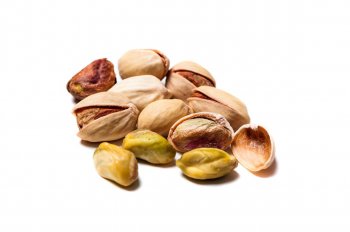
The study reviews most of the research studies and clinical trials regarding pistachio consumption and health.
A varied and balanced diet and a healthy lifestyle is key to good health and pistachios contribute to both. They have many nutrients such as fiber, potassium, magnesium, zinc and vitamins (B6, E, K…) that make pistachios a healthy and satisfying snack.
Pistachios and obesity
Studies have shown the inclusion of pistachios on a healthy diet does not increase body weight. Fiber is important for weight management and to lower the risk of cardiovascular disease, as several studies have consistently demonstrated. Pistachios are rich in fiber (containing 10% by weight of insoluble form).
Many studies have provided strong evidence that nut consumption is associated with neither weight gain nor increased risk of obesity, especially the study of Dr. Li and her team at the University of California, Los Angeles Center for Human Nutrition (USA), showed strong evidence that the intake of pistachios as a snack may lead to a higher reduction of body mass index compared with a refined carbohydrate snack.
Pistachios and cardiovascular disease
Pistachios are a good source of L-arginine, an amino acid is involved in the cardiovascular system as a key regulator of vascular tone. L-arginine is also involved in numerous pathological conditions such as hypertension, cardiovascular disease and neurodegenerative disorders. They deliver a broad range of nutrients and bioactive compounds that have been shown to reduce the risk of heart disease such as fiber, healthy fats, phytosterols and antioxidant compounds including polyphenols.
Also, pistachios are high in fiber and have potassium to help maintain normal blood pressure and muscle function; chromium to help maintain normal blood glucose levels, and copper to help support normal function of the immune system. The nuts are also high in unsaturated fats. Replacing saturated fats with unsaturated fats in the diet can help maintain normal blood cholesterol levels.
Pistachios and type 2 diabetes
Studies have shown the frequency nut intake is inversely related to the risk of type 2 diabetes (or the higher the consumption of nuts the lower the risk of diabetes), mainly attributed to anti-inflammatory compounds. They have a low glycemic index, which contributes to lower post-prandial blood glucose levels and maintaining satiety longer. It also may be a factor in maintaining glycemic control.
Another benefits
Among all this benefits, pistachios also provide energy to help muscle maintenance. They have magnesium to support normal functioning of the nervous system; iron for normal oxygen transport in the body; folate to help reduce tiredness and fatigue; zinc which supports the maintenance of normal vision; thiamin, riboflavin and vitamin B6 which contribute to normal energy metabolism; vitamin E, selenium and zinc which contribute to protection of cells from oxidative stress.
About the International Nut & Dried Fruit Council
The International Nut & Dried Fruit Council (INC) members include nearly 700 nut and dried fruit-sector companies from over seventy countries. INC is the international organization of reference regarding health, nutrition, statistics, food safety, international standards and regulations relating to nuts and dried fruit.



 Classifieds
Classifieds

